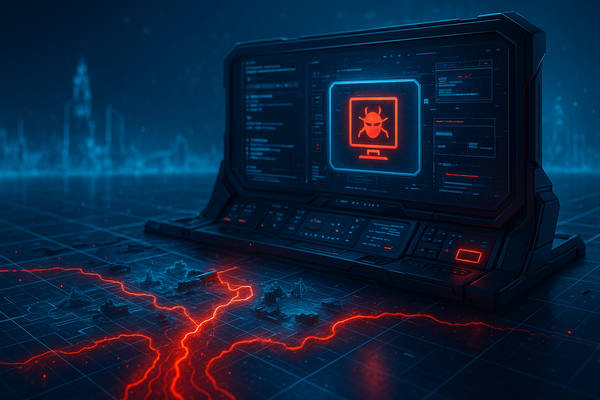Fake Battlefield 6 Pirated Versions and Game Trainers Used to Deploy Stealers and C2 Agents

Bitdefender Labs has identified malware campaigns exploiting the popularity of EA's Battlefield 6 first-person shooter, distributed via supposedly pirated versions, game installers, and fake game trainers across torrent websites and other easily found domains.
Electronic Arts' Battlefield 6, developed by DICE and published by Electronic Arts (EA), was released in October, and it's likely one of the most significant game launches of the year.
Cybercriminals take advantage of major events, such as the release of critically acclaimed games, to push their malware.
As soon as the game became available for purchase and download, criminals began spreading fake cracked versions of Battlefield 6 on torrent sites and underground forums. These supposedly cracked games are actually infected installers and apps delivering stealers, advanced evasion payloads and even command-and-control (C2) agents.
As a side note, there are many real groups that routinely crack newly released titles and their names are well known within the online community. InsaneRamZes and RUNE are just two of the more popular ones right now, which is likely why cybercriminals chose to use their names in the fake releases. It's a similar tactic used in attacks that try to mimic legit brands.
However, users who search for pirated versions of Battlefield are not the only targets. Battlefield 6 players might look for something to give them an advantage, and attackers know this all too well. So cybercriminals built game "trainers" that promise to do just that, only they are designed to steal information.
Our analysis of three such samples has revealed attacks weaponizing the game's popularity to compromise PCs and extract sensitive data.
Key findings
- Multiple Battlefield 6 "cracks" and "trainers" circulate online, but none are functional.
- The fake trainer is an aggressive infostealer, targeting browsers and crypto-wallets.
- The InsaneRamZes pirated version shows advanced anti-analysis and regional evasion techniques.
- The RUNE pirated version deploys a C2 agent capable of persistence and remote control.
- The malware samples have no real Battlefield-related functionality, and they are very likely from different groups
Pirated game versions and game trainers explained
Pirated versions of games have been around for years. Depending on the type of game and the protection used by the publishers, it's not uncommon to see a pirated version of a title pop up online on the same day as the official release.
Games that integrate advanced protection and have a very heavy multiplayer component, such as Battlefield 6, take a longer time to pirate. But not everyone knows this and there will always be potential victims who believe they are actually downloading the pirated version of Battlefield 6.
You might also notice that the pirated games investigated here are also accompanied by two additional names, InsaneRamZes and Rune. If you're not pirating games, they might sound strange. But these are real groups that crack new games releases. In this case, the attackers only use their names to lend credibility, in an effort to convince people that they are getting the real deal.
Making matters worse, the real RUNE group released a cracked version of Battlefield 6, which will only help spread malware. It’s very likely that users will access known torrent trackers and download the malware-ridden version by mistake.
As for game trainers, these are applications – often legitimate – that allow players to make changes to games, such as giving themselves more gold coins, other in-game resources, or even gaining immortality in first-person shooters.
These trainers are usually designed for single-player titles and don't work in multiplayer. Sometimes, the players get banned for using such software in multiplayer.
It's worth noting that some security solutions might detect game trainers as potentially dangerous due to how they work. In some situations, certain types of malware exhibit the same behavior as a legitimate trainer.
Fake Battlefield 6 trainer (Infostealer)
The first sample poses as a "Battlefield 6 Trainer Installer." Users can easily find the malware by searching for "Battlefield 6 trainers" on Google. Despite its small size and lack of obfuscation, it quickly steals data once executed.
The website (https[:]//flingtrainer[.]io/) is full of "trainers" that only push similar stealers. The name FLiNG is also stolen from a real game trainer developer known for his legitimate apps.
Behavior overview
The executable goes through local user directories and Internet browser profiles, retrieving data such as:
- Crypto Wallets and Cookie Sessions from Chrome, Edge, Firefox, Opera, Brave, Vivaldi, and WaveBrowser.
- Session tokens and credentials from Discord.
- Crypto-wallet extension data from Chrome add-ons like iWallet and Yoroi.
The stolen information is exfiltrated to 198[.]251[.]84[.]9 over plaintext HTTP, with no attempt to hide the traffic.

The malware's simplicity makes it highly effective, even if it lacks anti-analysis measures and even runs inside virtual machines.
‘Battlefield 6.GOG-InsaneRamZes’ (evasive malware)
The second sample, distributed as Battlefield 6.GOG-InsaneRamZes via torrent websites uses an entirely different strategy that includes stealth and environmental awareness.
Regional execution blocking
Before deploying its payload, the malware builds an array of locale identifiers and stops execution if it detects Russian or CIS regional settings.

Disassembly showing locale comparison with codes such as RU, AM, AZ, BY, KZ, KG, LT, and UZ, leading to immediate termination on matching systems.
This is a self-protection measure often used by Russian malware groups to avoid legal exposure in certain jurisdictions.
Windows API hashing
To obscure the way it works, the malware hides API calls behind hashed strings. When it runs, it tries to determine the hash of each target API (from system DLLs). When the hash matches, it will save it for later use.

Decompiled code demonstrating API hashing to obscure calls to GetSystemDefaultLCID, GetLocaleInfoW, and GetUserGeoID.
Anti-sandbox timing check
The malware also performs a GetTickCount() test, a technique used to detect whether it’s running in a sandbox. Basically, it tries to determine the system's uptime to figure out how long the machine has been running. This is a fairly common technique among attackers.
Developer tool targeting
The analysis of memory strings revealed references to software such as CockroachDB, Postman, BitBucket, and FastAPI, which suggests the stealer is targeting API keys or exfiltrating database credentials.
While the sample crashed before completing the full payload execution, the evidence suggests an intent to harvest other types of credentials, not just the regular ones from browsers, Discord, etc.
Battlefield 6 V4.8.8 DLCs - Bonuses -RUNE (C2 agent)
The third sample, disguised as a Battlefield 6 ISO image, delivers a persistent Command-and-Control agent.
Inside the ISO is a 25MB MZ executable containing a ZLIB-compressed object. Upon execution:
- The binary unpacks the ZLIB content.
- It writes a file named 2GreenYellow.dat to the current user's directory.
- It silently executes it using: regsvr32.exe /s /i "C:\Users\<User>\2GreenYellow.dat"
- The /i flag triggers the DLL's DllInstall export function.
The DLL includes three standard exports:
- DllRegisterServer
- DllInstall
- DllUnRegisterServer
Once initialized, the DLL repeatedly tries to contact ei-in-f101[.]1e100[.]net, which is on a domain belonging to Google. It's possible that the domain is being used as a relay or to disguise the C2 communications.
Although the C2 beaconing failed during testing, the code structure indicates it's designed for remote command execution or data exfiltration. Because this is a C2 agent, the number of attack vectors is countless.
Conclusion
The discovery of these malicious Battlefield 6 pirated versions and trainers underlines a very real, incredibly active threat model in the gaming landscape – attackers are exploiting players' curiosity and impatience for newly launched titles.
While it's impossible to tell how many people downloaded the malware, we observed hundreds of active seeders and leechers for the torrents, which means they're all potential victims.
The Battlefield 6 trainer showed up on page 2 of a simple Google search, indicating numerous possible victims.
None of the files analyzed offers any kind of functionality.
- Unsophisticated stealers for mass harvesting of browser and wallet data.
- Evasive payloads designed to avoid detection and focus on developer credentials.
- Modular loaders for remote control and future exploitation.
Bitdefender strongly recommends users:
- Purchase and download Battlefield 6 and other games only from official platforms (EA App, Steam, Epic Games Store, Uplay, GOG, etc).
- Avoid torrents, third-party "trainer" utilities, and unknown executables.
- Employ real-time behavioral protection to block malicious payloads before they execute.
tags
Author
Raul Bucur is the technical leader of a small team of security researchers. He's passionate about technology, malware reverse engineering, malware detection and forensics analysis.
View all postsSilviu is a seasoned writer who's been following the technology world for more than two decades, covering topics ranging from software to hardware and everything in between.
View all postsYou might also like
Bookmarks


